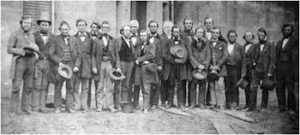
Oberlin Wellington Rescuers
*On this date, in 1858, the Oberlin Wellington Rescue occurred. In Lorain County, Ohio, this was a key episode in the history of the abolitionist movement in the United States.
Shortly before the American Civil War, a United States marshal in Oberlin, Ohio, arrested John Price, a runaway slave from Maysville, Kentucky. Under the Fugitive Slave Law of 1850, the federal government assisted slaveholders in reclaiming their runaway slaves. The marshal knew that many Oberlin residents were committed to abolitionism, and the town and college were known for their radical anti-slavery stance. To avoid conflict with locals and to quickly get the slave to Columbus and en route to the slave's owner in Kentucky, the marshal quickly took Price to nearby Wellington, Ohio, to board a train.
A group of residents rushed to Wellington. They joined like-minded residents of Wellington and attempted to free Price. After peaceful negotiations failed, the rescuers stormed the hotel and found Price in the attic. The group immediately returned Price to Oberlin, hiding him in the home of James Harris Fairchild, a future president of Oberlin College. A short time later, they took Price to Canada. Under British rule, Canada had no slavery.
A federal grand jury brought indictments against 37 of those who freed Price. Twelve of the rescuers indicted were free blacks, including Charles Henry Langston. He and his brother, John Mercer Langston, were both Oberlin College graduates and led the Ohio Anti-Slavery Society at the time. They both were politically active all their lives, Charles in Kansas and John taking leadership roles in state and national politics, in 1888 becoming the first Black to be elected to the US Congress from Virginia. Feelings had run high in Ohio in the aftermath of Price's rescue. When the federal jury issued its indictments, state authorities arrested the federal marshal, his deputies, and other men involved in John Price's detention. After negotiations, state officials agreed to release the arresting officials, while federal officials agreed to release 35 men indicted. Simeon M. Bushnell, a white man, and Charles H. Langston were the only two men to go to trial. The judge gave light sentences, assigning Bushnell to 60 days in jail and Langston to 20 days.

Bushnell and Langston filed a writ of habeas corpus with the Ohio Supreme Court, claiming that the federal court did not have the authority to arrest and try them because the Fugitive Slave Law of 1850 was unconstitutional. The Ohio Supreme Court upheld the law's constitutionality by a three-to-two ruling. Members of Ohio's abolitionist community were incensed. Over 10,000 people participated in a Cleveland rally to oppose the federal and state courts' decisions. In time, regional tensions over slavery, constitutional interpretation, and other factors led to the outbreak of the American Civil War.
The Oberlin Wellington rescue is important for attracting widespread national attention in a region of Ohio known for its activity with the Underground Railroad. Those who participated in the rescue and their allies continued participating in Ohio and national politics. Two participants in the Oberlin Wellington Rescue, Lewis Sheridan Leary, and John A. Copeland, along with Oberlin resident Shields Green, joined John Brown's Raid on Harpers Ferry in 1859. Leary was killed during the attack on October 20, 1859. Copeland and Green were captured and tried with John Brown. They were convicted of treason and executed on December 16, 1859.